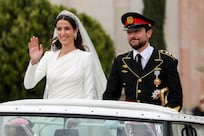Kindle, Kobo, iPad, Nook ... e-readers can take their pick. But for true literary pleasure, says the author Jasper Rees, only one handheld reading device stands the test of time - the book.
have you got one? Or have you most affirmatively not got one? Do you know anyone who's gone and converted to one and now swears by it? I refer, obviously, to the handheld reading device known as the Kindle. One cannot know exactly why Amazon chose that name. Presumably it's to do with lighting a flame that will spark a revolution - in this case a revolution in reading habits.
A revolution has already happened once in the history of reading. Shortly after Herr Gutenberg invented the concept of printing using movable type in the 15th century, it became possible to devour a work of literature without having to wait for a scribe, usually an underling from a religious order, to scratch out your individual bespoke edition. For a number of centuries the handheld reading device formerly known as the "book" held sway. You wanted to read a book. You read it in book form. As a system, it pretty much worked. Customer satisfaction was high.
Then came the internet, the microchip and the 21st-century craze for fitting large amounts of information into infinitesimally small spaces. While iTunes and Spotify were slugging it out for musical supremacy, Amazon and other digi-empires began fighting like King Kong and Godzilla for dominance in the post-book market.
The Kindle is not the only gizmo onto which you can upload books. There is also the Kobo, the preferred app for the new BlackBerry Playbook; the Nook from Barnes&Noble; the Condor eGriver Touch; the Entourage; the Fnac; the Foxit eSlick; the iRex; the Jinke; the Onyx Boox. None of the people who name these brands seems able to spell, but we'll let that pass.
Kindle, in its various incarnations, is the one that everyone has heard of. As of last year, it accounted for more than half of all e-readers sold. The International Data Corporation reports that in 2010 total sales of e-readers were 12.8 million, up 325 per cent from the previous year. Amazon says e-books now account for more than half of its fiction sales.
In short, if you're reading a novel with old-fashioned things such as pages and ink, there is a danger that you are about to become part of a cultural minority, like fans of atonal music and Welsh speakers. I mention the latter because I've just written a book about learning Welsh. Whenever I mention it in conversation, there's always something that a certain type of person wants to know first.
"Is it available as an e-book? Can I read it on my Kindle/iPad/Nook/Fnac/Jinke/etc?" The truth is I have no idea. I pay a visit to Amazon and there it is: available in paperback and the telltale "other formats". I contact my publisher, Profile Books, for clarification and am put through to its digital supremo, Michael Bhaskar. Hasn't the whole publishing industry been blindsided by this phenomenon?
"The speed has been surprising," he says. "The take-up has happened very quickly. It's not what's happening that is unexpected so much as things happening fast and in unpredictable ways."
Four years ago there was no such thing as an iPhone. The notion of the downloadable app did not exist. "We are still in a position where new entrants to the market can quickly have an impact," Bhaskar says. "Commercial technological developments happen at a constant rate." The Kindle was introduced in 2007, and is already several generations on from its original design.
That still raises the question of who reads on these things, and why, and indeed what? Plainly readers of e-readers are going to have a dominant geek gene. Which is why it's no surprise to learn that the most popular genre among e-books is popular mass-market fiction. It's the biggest-selling form of book anyway, but, to be tempted into a reductive conclusion, those who like the more challenging literature are more likely to have a romantic attachment to the tactile pleasure of leafing rather than scrolling.
I count myself firmly in this category. The digitisation of pretty much every other area of life I'm happy to accept. If they invented a digital dog-walker, a digital chef or a digital chauffeur, I'd probably invest. But a digital reader? Imagine a future devoid of browsing contentedly in bookshops, of spines lined up regimentally on your shelves at home. How on earth do you get an author to sign an e-book?
Meanwhile, Bhaskar sets my mind at rest: "I don't think there is any evidence the print book will go away and there are a lot of good reasons to think that it won't. We will have a mixed environment. There will be print books and e-books, and people will flit between them."
Not me - I'd rather flit my wrists.
Jasper Rees's book Bred of Heaven: One Man's Quest to Reclaim His Welsh Roots was published this month.




